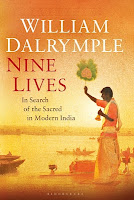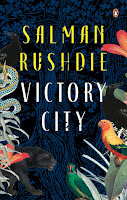Wednesday, December 15, 2010
Tuesday, December 07, 2010
The report card
23 blog posts, a couple of them decent. A job upgrade that wasn't really one. A freshly painted house. A new blog of experiments that quickly became defunct. Tiger sighting in Ranthambore. A disappointing I-phone. Being a tourist in Delhi. Showing my mom the Taj. Self-doubt like never before. Friends as back up. Prague. A grandmom's 90th birthday. Amsterdam. And not a single point in the bucket list that has been ticked off. Been that kind of a year.
Sunday, December 05, 2010

Nine Lives
William Dalrymple
That India is rapidly changing is a cliche. But in this exhilaratingly fast race to modernize, of getting to a place we are all proud of, are we in danger of letting go of some unique ways of life, distinctive belief systems, a heterogeneity that has been so much a characteristic of us?
Dalrymple attempts to chronicle these in-between spaces, 'in the places between modernity and tradition'. Where in small towns and even smaller villages across the country, very diverse and very old systems of faith and sacred lore are colliding with life-changing technology, newer ways to earn a living, a fresh set of beliefs. It is a travel book that goes deeper than most travel books go. It proves to be a snapshot of a time in our history that may be far more significant than we now think it to be.
Dalrymple writes about the lives of 9 people; each of them part of ancient tradition, passed on from generation to generation; each of them holding on to that tradition in the face of an invasive modern world; each tradition part of the diverse notions of that spirituality we Indians hold dear.
One is a Jain monk, a woman who has walked away from riches to lead a life of a detached ascetic, only to find her biggest test of detachment yet - the slow ritualised death of her dear friend. One is Hari Das from Kerala, a prison warden for most of the year and a Theyyam dancer for 3 months of it; when he lets the gods possess him and he transforms from an insignificant lower caste man to a god worthy of worship in the eyes of his audience. Then there is Rani Bai, a prostitute dedicated by her family to the goddess Yellamma, one in a long ancient line of 'devadasis' or temple dancers. The tradition might be ancient and rich, but today, Rani Bai is nothing more than an insignificant part of a flourishing flesh trade battling that same vicious battle prostitutes around the world battle against - disease and disgrace. Another is a Tibetan monk who fled Tibet along with the Dalai Lama only to end up fighting in the Indian army during the Bangladesh war and then spends the rest of his life atoning for his killing, making prayer flags. And yet another is Srikanda Stpathy, maker of the most exquisite bronze idols in Tamil Nadu, again the inheritor of a traditional profession that goes back seven centuries. Only this time, Srikanda is not sure the tradition will continue. His son and his brother's son want to study computers and move away.
Dalrymple moves to Rajasthan to meet Mohan Bhopa, a singer of epics in the desert. The songs have been sung for centuries, passed on from generation to generation orally, never written down till as recently as the last century. The songs are of stories of local heroes, who rustle cattle from the demon king Ravan and protect their women from Muslim invaders. These epics, along with the Theyyam of Hari Das, the songs of the Bengal Bauls and the legend of goddess Tara in Tarapeeth in Bengal form a rich tapestry of very local renditions that fluid Hinduism can make. In fact, Dalrymple makes a case with these stories against the homogenisation of the Hindu epics, wrought by the serials on national television. It's true. The different local takes of those great epics are in danger of being eroded.
Then there is the Sufi Lal Pari - the Red Fairy. A devotee at the Lal Shahbaz dargah in Sindh, Lal Pari represents the softer more fluid side of Islam that flourishes in South Asia. An Islam that is however under severe threat from the homogenised harsh interpretation of the Quran that the Wahhabis and Deobandis propogate. The Sufis who declare their devotion to God through mesmerizing music and dance again form Dalrymple's case against a homogenisation of religion and the loss of individual and very local interpretations of it.
Dalrymple lets the nine people speak for themselves, with little commentary or opinion. It's touching and immensely educational. It is a lovely little book that makes you realize the richness and sheer variety of spirituality in India. And the danger this diversity is in, in the modernised version of the country.
Saturday, November 27, 2010
Why do I like Bukowski so much?
His ability to say the profoundest of things in the most commonsensical way. His disregard for correctness in form. The complete lack of any kind of self-pity, even when he is describing the worst parts of his life. An almost Zen-like detachment at times in describing the horrors of soul-less working class living. And the wonder of not losing passion in that detachment. There is crudity too (I think that when a woman has kept her legs closed / for 35 years / it's too late / either for love / or for / poetry), in a very working-class Stanley Kowalski way.
Reading Bukowski to me means a lot of underlining... words to savour separately again and again. Here are some underlined ones from a Bukowski collection I just read.
--------------------------------------------------------------------------------------------------------------------------------------
...to fight for each minute is to
fight for what is possible within
yourself,
so that your life and your death
will not be like
theirs.
be not like them
and you will
survive.
minute by
minute.
---------------------------------------------------------------------------------------------------------------------------------------
beware women grown
old
who were never
anything but
young.
-------------------------------------------------------------------------------------------------------------------------------------
it's not so much that nothing means
anything but more that it keeps meaning
nothing.
there's no release, just gurus and self-
appointed gods and hucksters.
the more people say, the less there is to say.
even the best books are dry sawdust.
-------------------------------------------------------------------------------------------------If you’re going to try, go all the
way.
Otherwise, don’t even start.
If you’re going to try, go all the
way.
This could mean losing girlfriends,
wives, relatives, jobs and
maybe your mind.
Go all the way.
It could mean not eating for 3 or 4 days.
It could mean freezing on a
park bench.
It could mean jail,
It could mean derision,
mockery,
isolation.
Isolation is the gift.
All the others are a test of your
endurance, of
how much you really want to
do it.
And you’ll do it
despite rejection and the worst odds
and it will be better than
anything else
you can imagine.
If you’re going to try,
go all the way.
There is no other feeling like
that.
You will be alone with the gods
and the nights will flame with
fire.
Do it.
All the way.
You will ride life straight to
perfect laughter.
----------------------------------------------------------------------------------------------
To end up alone
in a tomb of a room
without cigarettes
or wine--
just a lightbulb
and a potbelly,
grayhaired,
and glad to have
the room.
...in the morning
they're out there
making money:
judges, carpenters,
plumbers, doctors,
newsboys, policemen,
barbers, carwashers,
dentists, florists,
waitresses, cooks,
cabdrivers...
and you turn over
to your left side
to get the sun
on your back
and out
of your eyes.
The Power of the Story
Victory City by Salman Rushdie It is amazing to see how much of real history finds its way into Rushdie's latest novel Victory City. ...

-
56 was the number this year. Though I tell myself numbers don't matter, the quality does, I always start with the number. The least it...
-
Pilgrim at Tinker Creek By Annie Dillard Annie Dillard does a Walden, only this time set in ‘70s Virginia. She describes a year in her life,...
-
The Covenant of Water Abraham Verghese An engrossing inter-generational story set in lush Kerala, it is easy to see why this made it to t...


